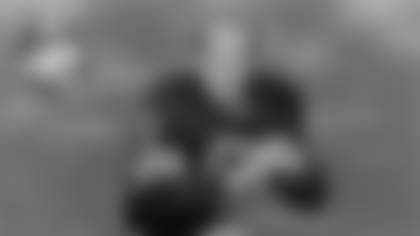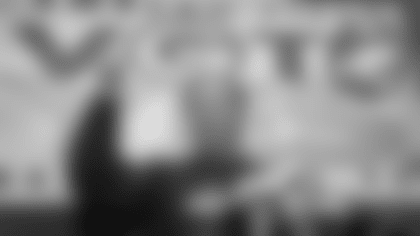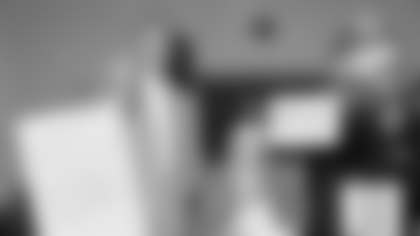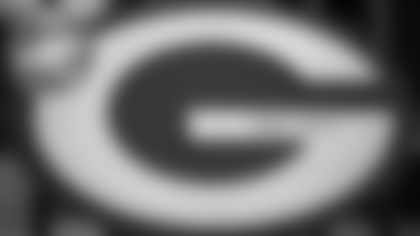Tom from Chesterfield, VA
Just snooping through Pro Football Reference and looking at the 1963 season, when the Packers tied Detroit, 13-all, in a late-season game. The margin was a missed extra point by Jerry Kramer. A record of 12-1-1 would have beaten out the Bears for the Western Conference title, correct? This is more than a little ironic considering Paul Hornung's kicking woes were a major reason the Packers underperformed in '64. Follow up: In '63, Tom Moore more than made up for Hornung's absence, averaging five yards a carry and nearly matching his career-high rushing stats. Is it your opinion that No. 5 would have made a difference in the two games with the Bears?
For those who need a refresher, the Packers finished 11-2-1 in 1963 and in second place in the Western Conference to the 11-1-2 Bears. The Bears then beat the New York Giants 14-10 to win the NFL title. Had the Packers won that year it would have been Vince Lombardi's first threepeat.
Let's address that season's conference race first. It wasn't until 1972 that the NFL changed its rule and ties were counted as a half-win and half-loss. In 1963, ties weren't counted in the standings. Thus, the Bears finished with a .917 winning percentage (based on an 11-1 record) and the Packers (11-2), an .846 percentage. Had the Packers beaten Detroit on Thanksgiving, they would have finished 12-2, not 12-1-1`as you stated, for an .857 winning percentage. Either way, the Bears would have won the conference title.
As for the Lions game, it was one the Packers could and should have won. Not only did Kramer have his extra point attempt blocked after the Packers' first touchdown in the second quarter, he missed a 10-yard field goal early in the fourth quarter with the score still tied, 6-6. He also was short on a 49-yard attempt earlier. Meanwhile, Wayne Walker, Detroit's kicker and a starting linebacker, missed three field goals from 42, 52 and 40.
Following Kramer's 10-yard miss, the Packers took a 13-6 lead with 9:09 remaining, but the Lions then marched 78 yards in 20 plays with fullback Nick Pietrosante scoring on a one-foot run to tie the game with 16 seconds left.
No question, in the two seasons that Lombardi's Packers didn't win championships between 1961 and '67, their kicking game was atrocious. In '63, Kramer missed three extra points and was just 16 of 34 on field goal tries, including nine misses in his last 10 attempts and nine misses from inside the 30-yard line. A year later, Hornung was 12 of 38 on field goal tries and had eight misses from inside the 30. He also missed two extra points.
But bad as the kicking was, I don't know that it cost the Packers the conference title either year. In '63, they lost to the Bears, 10-3, in the opener and got blown out 26-7 in their mid-November showdown. In '64, the 8-5-1 Packers finished three-and-a-half games behind the 12-2 Baltimore Colts. More went wrong than just the kicking game.
As for your question about Hornung making a difference against the Bears if he hadn't been suspended that season for gambling, here's what I can tell you.
On one hand, there were plenty of coaches and players, including Lombardi, that said or at least suggested the loss of Hornung was what cost the Packers the title. When the Packers played in the Playoff Bowl – or Runner-up Bowl as many called it – in Miami a week after the Bears beat the Giants for the championship, Hornung's loss was certainly buzzworthy.
Lombardi told The Miami News, "Our most significant injury (his word) was the loss of Paul Hornung." Lombardi offered that comment despite Bart Starr missing four games with a broken hand, Ray Nitschke the last two with a broken arm and Moore close to a third of his possible playing time with assorted injuries.
Guard Fuzzy Thurston told the News that the Packers' offensive line had played better than it ever had, but Hornung was missed. "His presence gave the team a magic lift," said Thurston. "Moore also is an extremely good runner, but we didn't have depth back there. Bart Starr … was out some games and that hurt. Hornung uses us – his offensive linemen – 100 percent. He makes our blocking look easy."
Norm Van Brocklin, coach of the Minnesota Vikings, told columnist Edwin Pope of The Miami Herald, "The difference between the Packers with Hornung and without him is the difference between first and second place." And Cleveland defensive end Bill Glass told Pope that he agreed with Van Brocklin. "It wasn't just that he was such a terrific runner," Glass said of Hornung. "The thing was, when he came at you wide with the ball, you never knew whether he was going to keep running or throw the ball. He really tied the defense into knots."
Not everyone went that overboard in assessing Hornung's loss. For example, Browns defensive tackle Bob Gain pointed out, "It's true Hornung is an exceptionally gifted player, and the Packers may not be quite as good without him. But I wouldn't blame Green Bay's missing the championship on that alone. After all, he's only one man and they have plenty of good ones."
A week after the Playoff Bowl and with more time to reflect, sports editor Oliver Kuechle of The Milwaukee Journal asked Lombardi in a Q&A how much Hornung was missed. His answer: "Obviously a lot. His blocking, his leadership, his devil-may-care attitude, his field goal kicking, his intelligence on the field."
I lived my teenage years following the Lombardi Packers and reading everything I could get my hands on about those teams, including Art Daley's stories in the Green Bay Press-Gazette, Bud Lea's in the Milwaukee Sentinel, "Run to Daylight" and other Packers books, Sport magazine, Sports Illustrated, The Sporting News, Street and Smith's football yearbooks and the Pro Football Illustrated newspaper published in Chicago and what I viewed as the forerunner to Pro Football Weekly.
Based on comments I read from people inside the game and what I observed from watching maybe every game from 1959 to '67 as a season ticketholder in Green Bay and a television viewer of the Milwaukee and road games, as well as games at Lambeau Field when I couldn't make it back from college, it was embedded in my mind that Hornung was the Packers' star player.
I don't care what the stats suggest. When Lombardi himself, Hornung's teammates and scores of opposing coaches and players repeatedly talked about his value, how the offense was built around him and his greatness, how stupid would it have been of me to think I knew better?
Yes, like so many other great running backs, Hornung's career was abbreviated by injuries. His best seasons were 1959, '60 and '61. Remarkably, he was the league's MVP in '61, despite not practicing over the second half of the season and showing up for games on weekend passes from his Army base.
But he suffered a neck injury late in the 1960 season that bothered him the rest of his career and a knee injury in the fifth game in 1962 that limited his playing time and also proved to be a nagging problem beyond that. Then came the suspension, a solid comeback season in '64 other than his kicking, another injury-riddled season in '65 and a recurrence of his neck injury in the sixth game in '66 that ended his career.
But Hornung was the player that Lombardi built his power-running offense around. And he always seemed to play his best in the biggest games.
Back to your bottom-line question: Do I think Hornung would have made a difference in the two losses to the Bears in '63?
In the 10-3 loss in the opener, Starr threw four interceptions and passed for only 83 yards, and the Packers finished with only nine first downs and 150 total yards. In the second game at Wrigley Field, Starr's replacements John Roach and Zeke Bratkowski combined to throw five interceptions, while the Bears rushed for 248 yards on 60 carries.
That said, Roach had won his first three starts as the Packers averaged better than 30 points a game; and three days before the Bears game, Lombardi announced he was starting Roach, although Starr was ready to play. However, after the game, when asked if Starr could have played, Lombardi gave a one-word answer, "No."
Basically, the Packers were manhandled by the Bears in both losses. With that in mind, it's hard to imagine one player making a difference. Plus, Bears left defensive end Bob Kilcullen said in a 1997 interview that right tackle Forrest Gregg was tipping off the Packers' signature play and the one Hornung made famous, Red Right 49, the power sweep.
"I'll never forget on the sweep, whenever they tried to come around (our) left end, somebody picked up that Forrest Gregg would cheat out about six inches," Kilcullen told me. "So (left linebacker Joe) Fortunato and I talked about it, and we were aware of it. If I moved outside that let him know that I was thinking they were coming around the outside. Each time Forrest cheated out there, sure enough, here they came."
The one unknown would be what effect Hornung might have had on the team's psyche?
Thurston said in Miami before the Playoff Bowl that the Packers were "too tight and ready to play too soon" before both games against the Bears. The loss in Chicago also was the only time a Lombardi team didn't meet the challenge in a must-win game. Accordingly, both Lombardi and teammates credited Hornung with being the leader in the locker room who kept his teammates loose and inspired them with his confidence before big games.
"Before our 1961 championship game I was under the impression that Moore could run as well as Hornung and that Ben Agajanian could kick as well or better, but the week before the game, when Paul got that leave from the Army and walked into the locker room, you could just feel the confidence grow in that room," Lombardi wrote in "Run to Daylight."
When I asked tight end Ron Kramer in 1996, if Hornung would have made a difference if he had played in 1963, he said the Packers were able to compensate for his physical loss but not the intangibles he brought to the team.
"Hornung had a great esprit de corps," said Kramer. "He had more of an influence spiritually, psychologically, than he ever did physically. Don't get me wrong. He was as good as anybody around. All he could do was beat your (butt). But everybody had these great feelings for him. We still do."
But those are factors no outsider could ever gauge or measure. No reporter, no stat wizard, no historian, no fan.
Tony from Wisconsin Rapids, WI
I have read "The Greatest Story in Sports," numerous articles from you and countless books about Packer players. I was interested in why Jim Taylor has not been honored more as a player. I remember reading one article that he was more concerned with personal accomplishments rather than team success. Players' books hinted he was not a team player, and he didn't really mix with other players. What are your thoughts on Jim Taylor?
First, thanks for being a loyal reader, and I would note that Taylor has received the ultimate honor in pro football: induction into the Pro Football Hall of Fame. But it's an interesting question and Tom of Chesterfield asked much the same thing. Here's how he phrased it.
"Taylor's drive and demeanor always seemed to me to be more in line with Lombardi's. And his production was second only to Jim Brown during his era. But for whatever reason he and Vince seemed to barely tolerate each other. Throw in the fact that Hornung may have tanked the Packers' chances to threepeat in '63 with his gambling scandal, and it's hard to understand what could account for the difference in Lombardi's attitude and affection towards Paul, and his disdain for No. 31. Could it be that they were simply too much alike?"
Again, there's no way any outsider could know the inside story regarding Lombardi's true feelings about Taylor or how the first player of his inducted into the Pro Football Hall of Fame interacted with his teammates.
No question, Taylor was a productive, powerful, never-say-die runner. At a time when fullbacks were often the principal ball-carriers in NFL offenses, there was no one better other than Jim Brown and, still, Taylor almost always outgained him when the Packers played Cleveland. In 1961, for example, when the Packers won their first NFL championship under Lombardi, of the 14 leading rushers on each team, seven were fullbacks, including Taylor, and seven were halfbacks.
When the Packers won their first two titles under Lombardi in 1961 and '62, their running game was their strong suit. And Taylor finished second to Brown in rushing in '61 and led the league in '62. In '61, Taylor averaged 5.4 yards per carry to Brown's 4.6, and in '62, he rushed for 333 more yards than runner-up John Henry Johnson.
Many consider the 1962, 13-1 Packers to be the best of the Lombardi era, and Taylor was the NFL's MVP that year. In contrast, Starr led the league in passing because of his proficiency in the statistical categories that counted in the ratings, but he threw only 12 touchdown passes with nine interceptions.
One thing I believe about Lombardi was that he relished coaching talent and driving a player to get the most out of it. And, no question, Taylor was the epitome of a player who got the most out of his ability. But Hornung was a much more gifted athlete, and he and Moore, his fill-in at halfback, were both bigger and faster than Taylor.
Otherwise, all I can go on is what you've apparently read about Taylor as a teammate.
In "Run to Daylight," Lombardi praised Taylor effusively for his desire and toughness. As a runner, Lombardi said his quickness and balance were exceptional. "I have never seen another football player with such balance," said Lombardi. But he also made the point that a fullback in his system had to be a "great blocker," and he had rather biting words for Taylor's effort in that area.
"Now, if I could just get him to block with the same abandon, he might be the best in the business," Lombardi wrote. "He is not a bad blocker, but he would be a great one with his ruggedness, his quickness and his agility, if they would just change the rules to let him carry a football while he's blocking."
Then there was what Ron Kramer told Tim Layden of Sports Illustrated that all "Jimmy cared about was how many yards he got." And what Lombardi's PR director Chuck Lane told me about what he sensed Lombardi thought of Taylor, that, "He was more of a Jim Taylor guy, than a team guy."
Lombardi also expressed no misgivings about Taylor playing out his option and signing with New Orleans after the 1966 season. "The Packers have been in this business for 47 years – is that right? – and they'll be in it for another 47 years, so we always will have to replace the Jim Taylors," Lombardi said.
Jerry Kramer wrote in "Distant Replay" how he "loved Jimmy like a brother" when they played together and how he also tried to shield and protect Taylor from criticism during those years. But Kramer also noted, "Jimmy had two large problems his first year in Green Bay. He couldn't remember his teammates' names and he couldn't remember the plays." And, in the end, Kramer went into considerable detail about his falling out with Taylor over a business deal.
Tony, I maybe haven't written anything that you didn't know. But it's all I know. And, as for Tom's question, I certainly don't think Lombardi found Taylor to be much like him. A core of Lombardi's coaching philosophy was stressing teamwork, unselfishness and two basic fundamentals, one of which was blocking.
Clark from San Diego
I've always been intrigued by Billy Howton and why he doesn't get more attention from Hall of Fame voters or Green Bay fans. He broke Don Hutson's records. He was the leading receiver when he retired. What is it about his career that doesn't resonate with historians?
The list of senior candidates was just released, and I see that Howton is on the list.
No question, statistically, Howton's records when he retired were more than worthy of Pro Football Hall of Fame consideration. And no less an authority than Raymond Berry, the Baltimore Colts receiver who broke Howton's records for career receptions and total yards shortly after he set them, agrees with you that he belongs in the conversation about possible senior candidates.
"I'll tell you a guy who is overlooked (as a Pro Football Hall of Fame candidate) is Billy Howton," Berry once told me. "(Howton) was extremely professional in his pass routes. He knew what he was doing to maneuver and fake to get open. He would be effective going inside, going outside, effective going deep. He was an extremely dangerous receiver and had great technique."
What might have hurt Howton over the years was what we just addressed in the previous two answers. What kind of teammate was he and whether that played any part in the Packers not having a winning season in his time in Green Bay from 1952-58.
When Lombardi traded Howton shortly after he finished his film study of the Packers' 1958 season under Scooter McLean, Milwaukee Journal beat writer Chuck Johnson wrote that Lombardi's reasons for trading Howton included his half-hearted blocking. "Howton had neither the size nor the desire to knock down halfbacks and linebackers," Johnson explained. He also wrote that Howton, frustrated by the play of quarterbacks Starr and Babe Parilli following the trade of his former Rice University teammate Tobin Rote, frequently expressed his unhappiness with the quarterbacks and tried to call signals for them in the huddle during the '58 season.
During an autograph session in San Diego before Super Bowl XXXII, Hornung talked about the instant impact Lombardi had on a 1-10-1 team that also was suffering from too many inflated egos. "For instance, there was Billy Howton, who was one of the greatest receivers of all time," Hornung told the Press-Gazette. "But all he wanted to know was where he stood in number of receptions and yards and that kind of stuff. We just didn't know what we were doing until Vince came along."
The fact that both Lombardi and Paul Brown, two of the greatest coaches in the history of the game, dumped Howton shortly after acquiring him probably hasn't helped him either. Lombardi traded Howton to Cleveland after one brief, offseason meeting with him; and then Brown traded Howton to the expansion Dallas Cowboys after one season.
What's more, Howton spent time in federal prison after being convicted in 1981 of swindling several institutions out of $8 million. While off-the-field issues aren't supposed to factor into the Hall of Fame voting, I can't imagine it didn't hurt his chances.
(Editor's Note: For now, the plan during the regular season is for Christl to continue his draft research and post Q&As on the first Thursday of October, November, December and January.)















